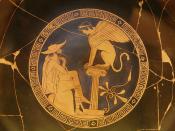Freewill Verses Fate
Oedipus is a play that delves into the themes of freewill and fate throughout its entirety. This is the story of a man and his struggles against his own destiny and his fight for the future that he desires. Oedipus wanted to deny his own predestination and make his own life.
The story all began by a prophecy upon Oedipus' life that one day he would kill his father, defile his mother's bed and wander the world for the rest of his life in blindness. At an age he made the conscious decision to deny the prophecy and move from what he thought was his hometown, to Thebes, in order to flee from his predestined plan for life. While some individuals chose to believe in predestination in order to maintain some level of peace, a sense that whatever is meant to happen will happen, Oedipus wanted a different outcome, and through his choices, did what he could.
At the beginning of the play, the priest explains Thebes is suffering from a plague. Plants, animals, and people are all dying. The people there know that Oedipus is not a god, but they believe that some god inspired him to solve the riddle of the sphinx and save the town. Since Oedipus has been king, he has done a splendid job, so now people look to him in order to find a cure for the plague. Oedipus explains that he has sent Creon (Jocasta's brother) to an oracle in order to get an answer. He's late returning, but as soon as he gets back, Oedipus promises to do whatever the oracle says. All that is known, at that point, is that Laius left for Delphi and never returned. There was no immediate investigation because of the sphinx problem.



???
It was good, but seems kind of rushed at the end.
Kind of felt that it read like a summary, not an essay...
10 out of 10 people found this comment useful.